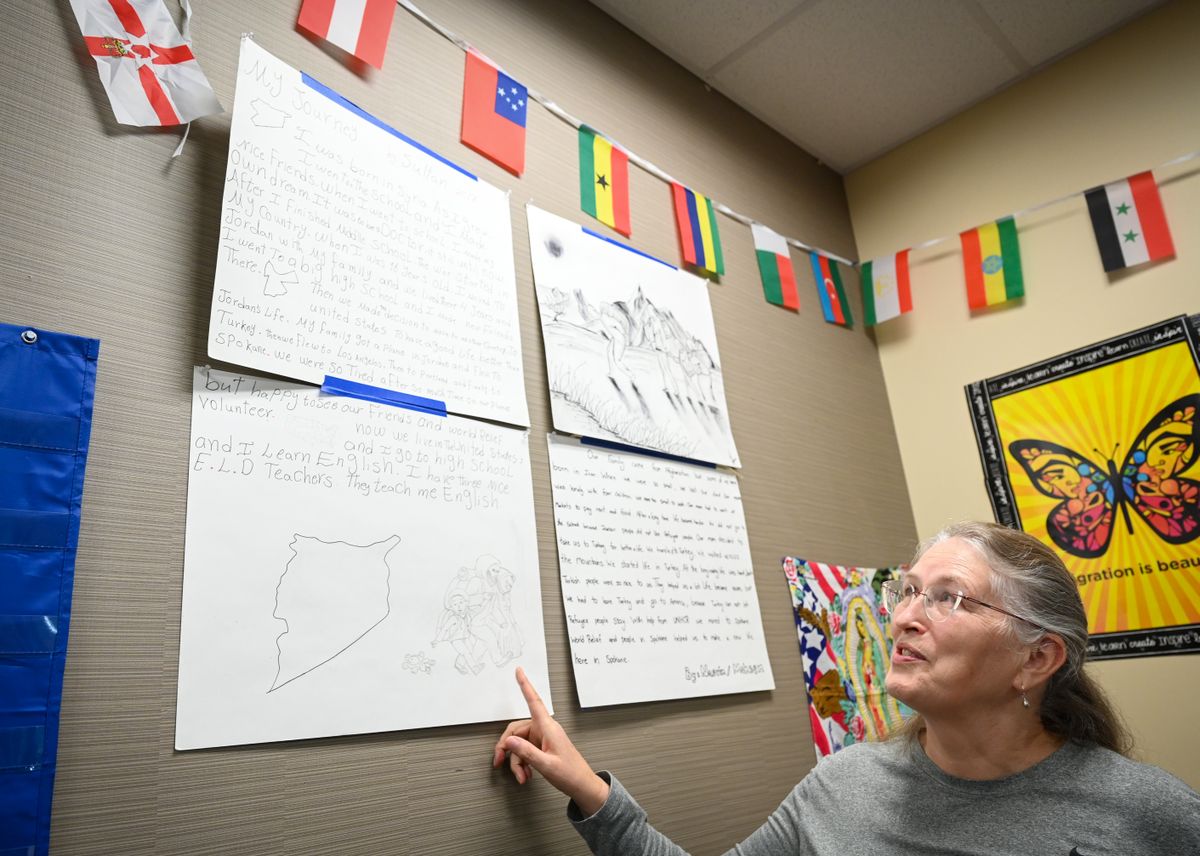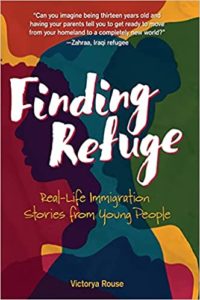FINDING REFUGE by Victorya Rouse (Eswatinia-Swaziland)
Tales from student immigrants in Spokane share their hardships and triumphs

Longtime teacher Victorya “Tory” Rouse looks at a personal story and some artwork from students in her English Language Development class at Ferris High School on Wednesday. Most of her students are new arrivals in the U.S. and need intensive English language lessons. (Jesse Tinsley/THE SPOKESMAN-REVI)
By Shawn Vestal shawnv Spokesman-Review
Sun., Oct. 24, 2021
•
When Fedja Zahirovic fled with his family from the Bosnian War to Spokane in the 1990s, he was “confused and angry,” uprooted from all he’d ever known, and didn’t know the language or the culture.
The first steps in his American education occurred at the Newcomers Center at Ferris High School.
“It was a safe place,” he said this week. “It was a good place for learning.”
And when Abdulrazik Mohamed arrived here with his family in 2012, as they fled the civil war in Sudan and years of life in refugee camps, the first steps in his American education occurred at the Newcomers Center at Ferris.
“The support was fantastic,” he said. “They tried really, really hard, and supported us in every aspect.”
And, in the days to come, as hundreds of Afghan refugees arrive in Spokane, the teenagers among them will also begin their American education in the Newcomers Center at Ferris High, laying the foundation for their new lives in Victorya Rouse’s classroom.
For nearly three decades, Tory Rouse has taught English to young people who have been driven from their homes by war, conflict and disaster.
“Some of them have some English” already, she said. “Some of them have none. And some of them don’t even have the same alphabet.”
All of them get Rouse’s crash course in the English language, the foundation on which they will get an education and build a future. In addition, they enter the family atmosphere of the class, in which Rouse helps them to form bonds with each other, mentor the new arrivals, and lift each other up.
“We always say, ‘We’re a family here,’ ” she said. “ ‘You’ve got to take care of each other like brothers and sisters.’ ”
The wide range of experiences students bring to her class is reflected in a new book she has compiled and edited, “Finding Refuge: Real-Life Immigrant Stories from Young People.” The book is a fascinating look into the lives of the young people who have fled their homes to make new lives here.
The stories in Rouse’s book do what all great stories do: connect readers with experiences outside their own, broadening their understanding of the world, their community and their fellow human beings. They replace simplified narratives with the specific realities of particular people.
This includes accounts of hardship and suffering, but also the ways in which these young people have established new lives as Americans – sometimes facing different kinds of hardships here as well.
For example, one student wrote about fleeing an impoverished life in Eritrea for Ethiopia as a 9-year-old, living in a refugee camp there for years, and finally coming to America as a 15-year-old.
“In America, I lived with a foster family,” wrote the student, identified by her first name of Uwam. “They did not speak my language and I did not speak their language. I think I cried for three months. I started school and started to learn English and everything else students need to learn in school. I made friends. Life became easier.”
‘English all day’
It’s particularly important for us in Spokane to understand the experiences of these students, given our city’s history of welcoming refugees and weaving them into the community – a dynamic that began after the Vietnam War, as refugees from that region of the world with connections in Spokane’s military community settled here. Rouse grew up in Minnesota and Illinois and began her teaching career as a Peace Corps volunteer in the Kingdom of Swaziland (now Eswatini) after college in the early 1980s. In that role, she became convinced that English language skills were a crucial foundation for her students to become educated, and decided she would return to Africa to teach English again.
“I actually left Africa with a round-trip ticket,” she said. “But then I married, had a kid, and then my husband got a job in Spokane.”
She altered her plans in one sense, but not in another: She remained engaged in giving students the language skills they need to become educated and improve their lives.
She taught for one year at Shadle Park High, and then moved to Ferris in 1992 to teach English as a Second Language – now referred to as English Language Development. She’s been there since, with the exception of two years when she tried an administrative position.
The Newcomers Center is the district’s program for immigrants and refugee high school students; once they have developed solid English skills, they return to the general student population at their neighborhood school.
Over the years, her students have come from the parts of the world where there is the most strife. In the early years, it was students from Vietnam and Southeast Asia, as well as the former Soviet Union. These days, there are many students from the Marshall Islands, Syria, Iraq, and Africa – with a contingent of Afghan students on the way following the withdrawal of U.S. troops there.
Zahirovic recalls his classmates in the 1990s as having come from Ukraine, Mexico, Ethiopia and Taiwan – “very multicultural.”
All high school ages and abilities are taught in the class, and the students operate at different skill levels.
The basic idea is to immerse the students in English as much as possible, to get them quickly into other classes, and to encourage them to help each other.
“It’s pedal-to-the-metal, English all day, until they’re kind of sick of it,” she said.
‘I feel like an American’
Rouse’s classroom reflects the relationships that have been formed there. A portrait of the Queen singer Freddy Mercury – one of Rouse’s favorites – hangs on the wall, a gift from a student who also made a pencil-drawn portrait of Rouse. Newspaper stories about a former student who became a track and field standout hang on the wall, as do other mementos.
And the ties live on beyond the end of the classes.
“I don’t forget my students,” Rouse said. “If I run into someone at Home Depot, I’m like, ‘Yes! You’re my kid!’ ”
Sometimes her students have been jarred from a life of relative comfort and success to arrive impoverished in a new country. Other times they’ve made it here after years and years in refugee camps – sometimes moving from one to another repeatedly. Though it might seem as if it would be hard for them to even think about school, Rouse said her students are often very motivated.
“Most of them are pushing themselves to excel in school,” she said. “It’s one place where they can cut down on the clutter in their lives and focus on doing well academically.”
Rouse was encouraged to publish “Finding Refuge” by a friend of her sister who works in publishing. Some of the material was revised from work students did in her class, some was written for the book. She helped edit and shape them, and wrote an introduction and afterward, as well as chapter of introductions about the countries the students came from.
Her idea is not to profit off the student work; she said she intends to use proceeds from book sales to contribute to an organization or program that assists refugees.
There are stories from all over the globe. Abdulrazik Mohamed, the Sudanese refugee, wrote of fleeing Sudan after his grandfather was killed, and spending years in refugee camps.
Qali, who is identified by first name only, as are other students in the book, wrote of arriving here from Somalia in 2013. Her father was shot dead by a terrorist when she was 4.
“People were all around us screaming and crying,” she wrote. “We were all in shock. There were gunshots and fires. Houses were burning and people were dying. There was no time to stop and pack the things we needed; we just ran for our lives. This was the Somali Civil War.”
Many of the stories are similarly harrowing, but Rouse did not want to omit the next chapter in these lives – what happened after refugees arrived here and started new lives. So the stories have epilogues, relating tales of graduations, marriages, new jobs and dreams of starting businesses.
“In 2018, I became a U.S. citizen,” wrote Amir, who fled Libya with his family in 2013. “In the future, I want to have a good job and help other people the way people have helped me.”
Zahirovic, who came here from Bosnia in the 1990s, found that some of the same divisions that lay underneath the civil war in the former Yugoslavia were still a conflict here. He had come from a mixed family – his father a Muslim and his mother Greek Orthodox – and many in the Bosnian Muslim refugee community were less than friendly here, he said.
Though he felt like an outsider, he found himself spending more time with Americans. He graduated from Ferris and then Spokane Community College. He eventually changed course and studied music in Portland, where he now teaches.
He married an American and become a U.S. citizen. His mom and grandmother have returned to the Balkans, settling in Montenegro. He speculates that after he retires he might split time between the countries.
Mohamed, after graduating from Ferris and Eastern Washington University, has gone on to do graduate work in international relations and African diaspora studies at Florida International University. Earning an education was one of his father’s main goals for his seven children, and they did it here – graduating from Ferris, Rogers and West Valley high schools, and Eastern Washington, Western Washington and Washington State universities.
Several of them got their start in the Newcomers Center.
“I’ve had five of them,” Rouse said.
Now, almost a decade after arriving here, Mohamed said, “I do feel like an American.”
“Gaining my citizenship was the greatest feeling – one of the most exciting experiences,” he said.
•
Finding Refuge: Real-Life Immigration Stories from Young Readers
by Victorya Rouse (Eswatine 1980- )
Zest Books
264 pages
September 2021
$11.49 (Kindle); $27.99 (Hardback); $14.99 (paperback)

No comments yet.
Add your comment